Georgia’s Department of Corrections has touted efforts to meet American Correctional Association (ACA) standards and even secured ACA accreditation at some facilities, claiming this brings a “safer and more humane environment” for inmates 1. In practice, however, conditions in Georgia’s prisons are anything but humane. A 2024 U.S. Department of Justice investigation found “horrific and inhumane” conditions in Georgia’s state prisons that violate the Eighth Amendment rights of incarcerated people2. Key problem areas include severe overcrowding, grossly inadequate food and nutrition, and deplorable sanitation and health care – all in clear violation of ACA’s guidelines for humane treatment.
Overcrowding and Unsafe Living Conditions

Georgia’s prison population (nearly 50,000 people) far exceeds the system’s design capacity (2 entire prisons are off-line, GSP & Autry, creating even more dire conditions), resulting in extreme overcrowding. Rather than reduce inmate numbers, Georgia has triple-bunked many prisoners in tiny cells intended for single occupancy3. In some facilities, three men are crammed into roughly 8×12 foot cells – giving each barely 9 square feet of personal space, far below ACA-recommended minimums (around 35 square feet per inmate)4. Even as far back as 2010, Georgia wardens were ordered to start triple-bunking due to budget cuts, “squeezing three prisoners into cells intended for one”3. By 2011, the Southern Center for Human Rights reported that Georgia’s overcrowded prisons had resorted to triple-bunking across the system5. Packing inmates this tightly creates dangerous, volatile conditions – tensions flare and violence becomes more likely when people are forced to live on top of each other. ACA standards call for adequate living space and manageable prison populations, yet Georgia’s facilities routinely house well over 100% of their rated capacity in defiance of those guidelines 6. State officials have acknowledged operating at 105% capacity with plans to add beds by triple-bunking inmates7, effectively normalizing overcrowding. These cramped, overfilled prisons are unsafe for both inmates and staff, and they directly contravene the ACA’s basic requirements for humane living conditions.
Meager Food Rations and Nutritional Neglect

ACA accreditation standards mandate that inmates receive nutritionally adequate meals at proper intervals (with no more than 14 hours between meals)8. Georgia’s prison food, however, fails to meet even minimum caloric and nutritional benchmarks. In most Georgia prisons, inmates are not fed three times a day – on Fridays, Saturdays, and Sundays they typically get only two meals plus a meager snack (often just a peanut butter sandwich “posing” as a third meal)99. As a result, prisoners go long stretches hungry; overnight gaps between dinner and the next day’s breakfast can exceed 16 hours, breaching ACA’s guideline of a 14-hour maximum interval between meals8. The calories provided are grossly insufficient. Estimates suggest Georgia inmates receive as little as ~1,200 calories per day on weekends and around 1,800 on weekdays9 – far below the ~2,200–2,500 calories recommended for adult men (and even less than the 2,800–3,000 calories active individuals may require)9. Virtually all the food is cheap, highly processed starch (much of it corn-based) with no fresh fruits, vegetables, or real protein .
Such diets fall short of ACA nutritional guidelines, which require oversight by a licensed dietitian and menus that meet accepted dietary standards. In fact, Georgia’s spending on inmate food is so low that adequate nutrition is impossible – only about $1.80 is budgeted per prisoner per day for food, equating to a meager $0.60 per meal10. (By contrast, even notoriously frugal prison systems like Florida and California historically spent roughly double that amount per inmate on food, and school lunch programs budget about $3.66 per meal for a single child)9. Georgia’s cost-cutting has even meant skipping meals: until recently, no lunch was served on weekends at most prisons – inmates got breakfast and a late-afternoon dinner only, effectively two meals a day9. (In 2024 the state allotted a bit more funding to add the token peanut butter sandwich as a “third” weekend meal, tacitly acknowledging that the prior practice left people far too long without food9.) The malnutrition and chronic hunger resulting from these paltry rations are not only unhealthy – causing weight loss, fatigue, and micronutrient deficiencies – but also linked to behavioral problems. Studies have found that hunger and vitamin deficiencies can increase irritability and aggression, fueling violence inside prisons9. Georgia’s food policies are effectively starving inmates and utterly flouting ACA standards that call for adequate caloric intake and balanced nutrition 11. In some cases, the food is literally unfit for human consumption – advocates have documented Georgia prisoners being served spoiled or tainted food; at one women’s prison, meals came with labels reading “Not Fit for Human Consumption” and people fell ill after eating mold-contaminated food 12.



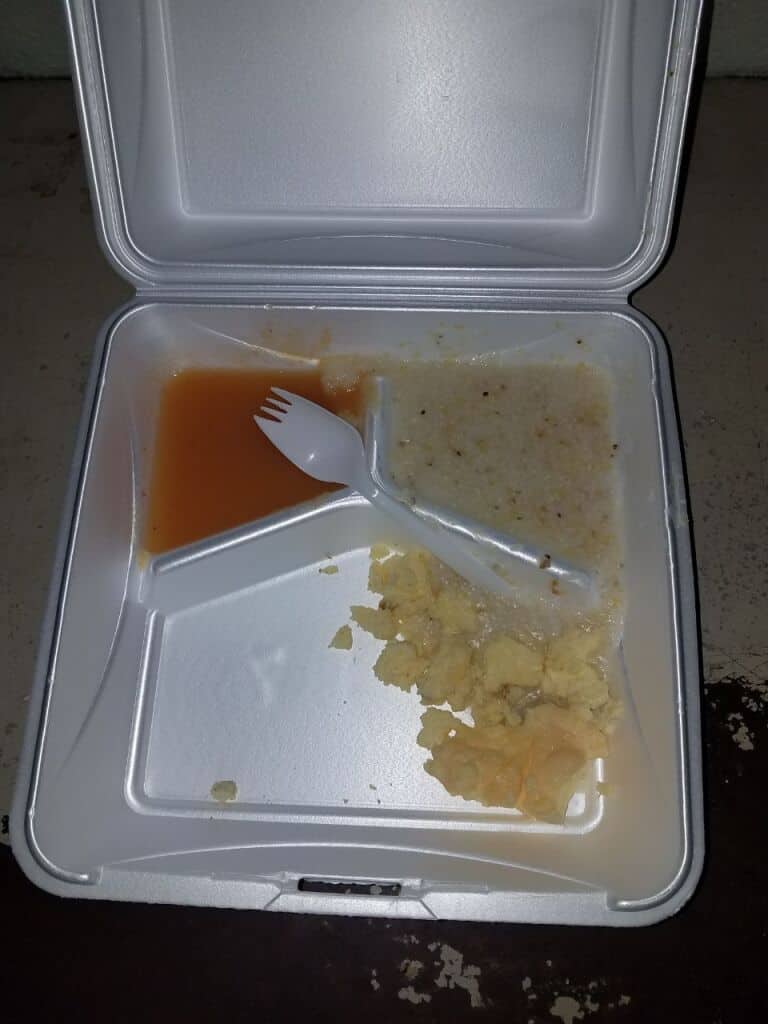
Filthy Conditions, Contamination, and Medical Neglect
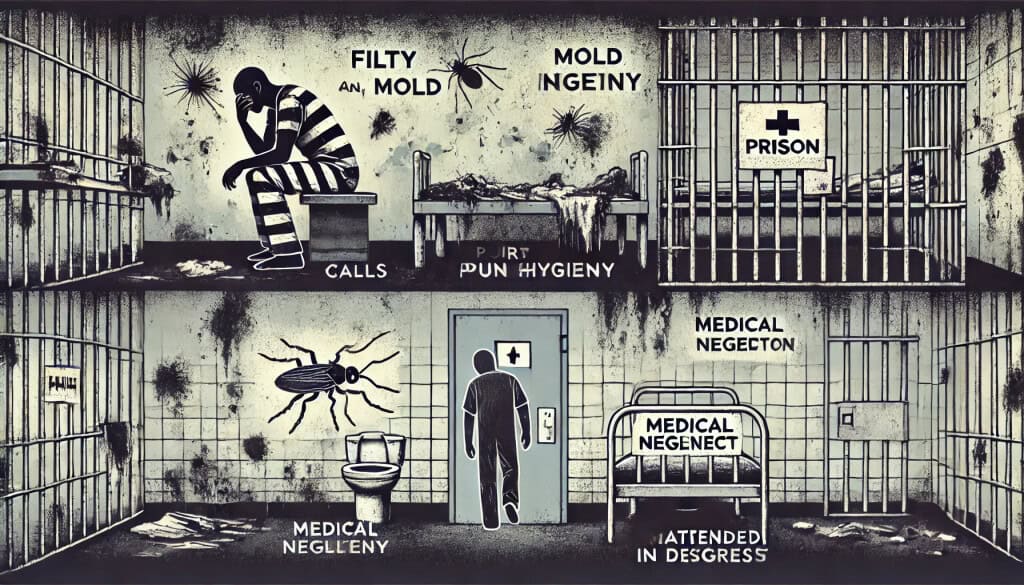
Basic sanitation and living conditions in Georgia prisons also violate ACA’s humane treatment criteria, which require clean, safe, and healthy environments. In reality, many facilities are dirtier and more dangerous than any ACA inspection should allow. Prisons are plagued by vermin infestations, mold, and filth. An investigation at Georgia’s flagship prison hospital (Augusta State Medical Prison) revealed garbage piled up in hallways, attracting swarms of flies and mosquitoes even inside the operating room – surgical staff had to swat away insects while treating patients13. Black mold was found spreading across ceilings and walls in medical units, and chronic leaks left standing water pooled in corners14.
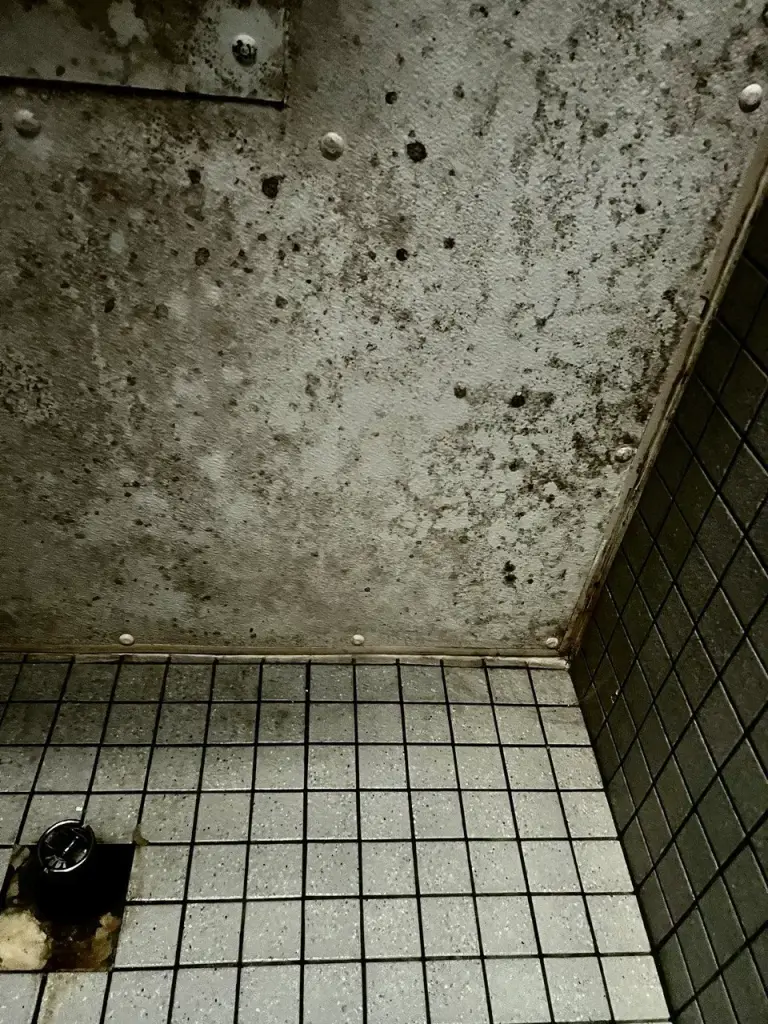
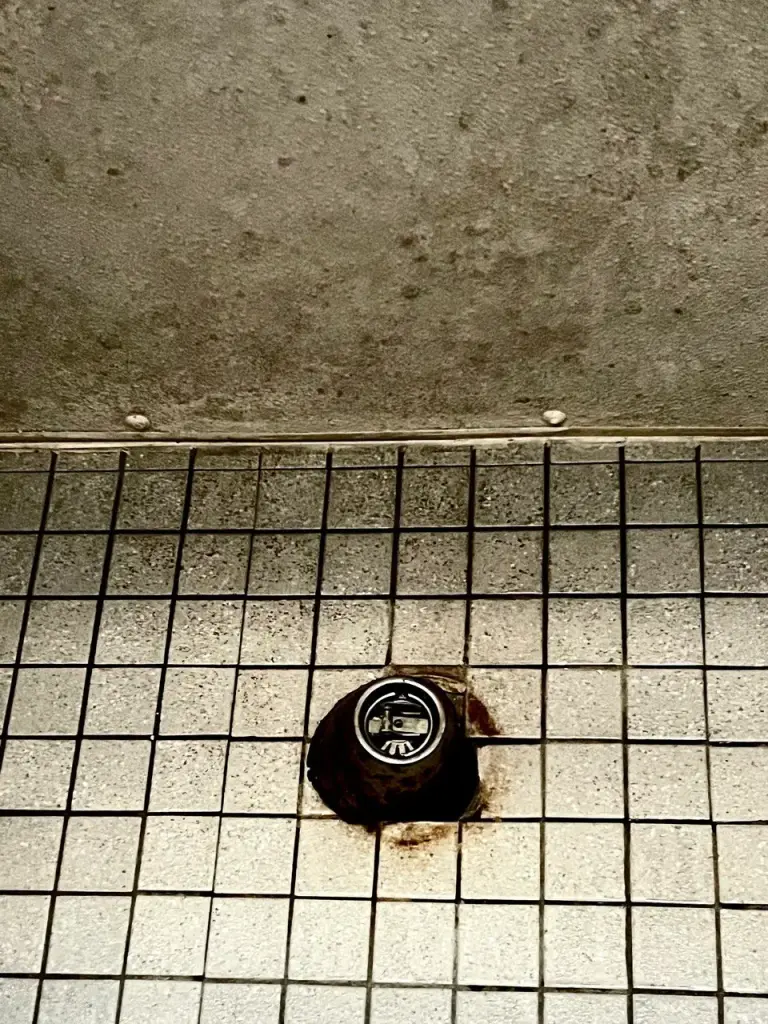
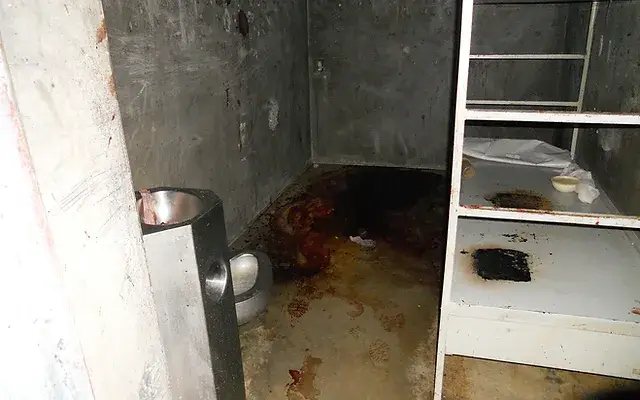
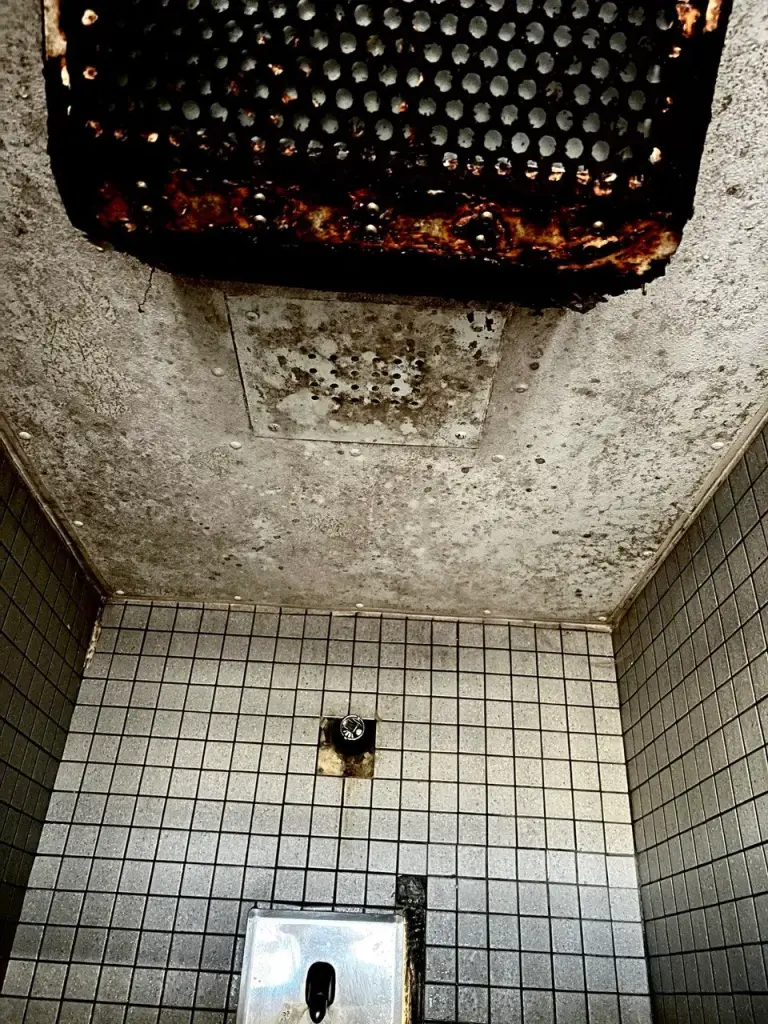
These grossly unsanitary conditions festered for months or years despite staff complaints, creating a breeding ground for infection and putting lives at risk14.
At other Georgia prisons, incarcerated people likewise endure squalid, unhygienic environments. A 2021 human rights report on Lee Arrendale State Prison (the state’s largest women’s facility) found that prisoners lacked access to clean water and proper hygiene. Women there suffered bacterial infections from contaminated water supplies, and mold infestations were so severe that inmates became ill from the fungus in their living areas12.
Pest infestations are common – one incarcerated mother reported finding a cockroach in her food; when she alerted an officer, she was denied any replacement meal and went hungry as punishment15. Cells and dorms are often overrun with roaches and rats, and some segregation units are “infested with insects, reeking of urine and feces” with old, spoiled food trays left uncollected16. These conditions clearly defy ACA sanitation standards (which require regular cleaning, pest control, and potable water access), yet Georgia’s prisons have been allowed to deteriorate to this third-world state.
Conditions make Georgia prison hospital breeding ground for infection
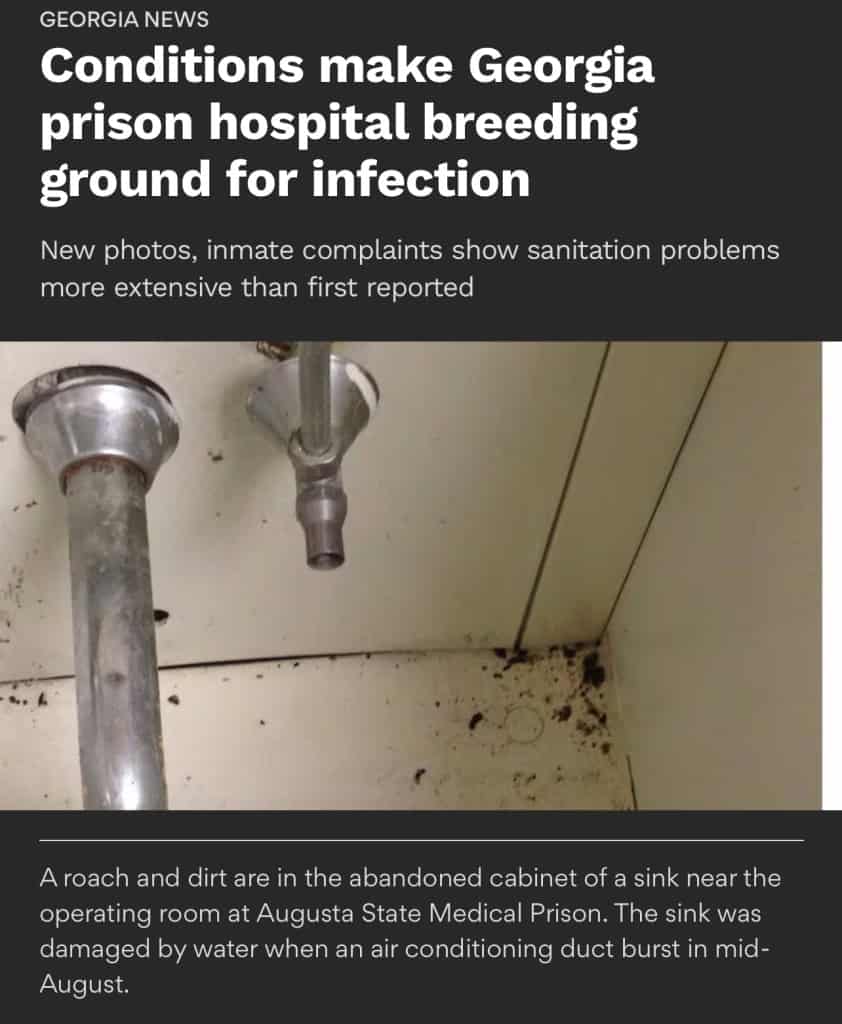
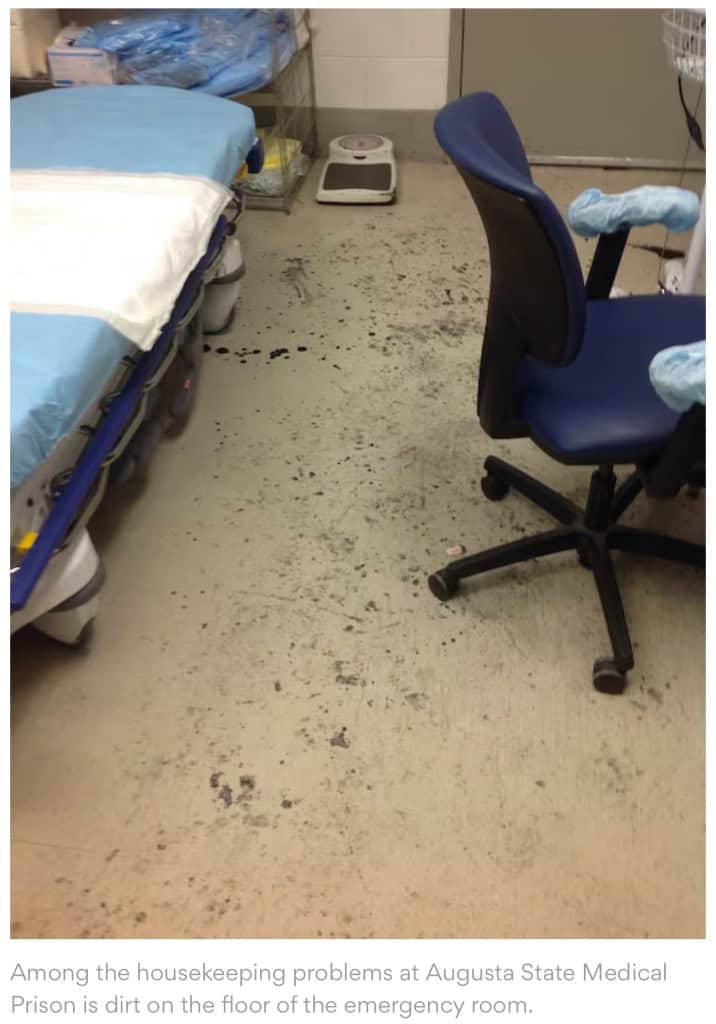
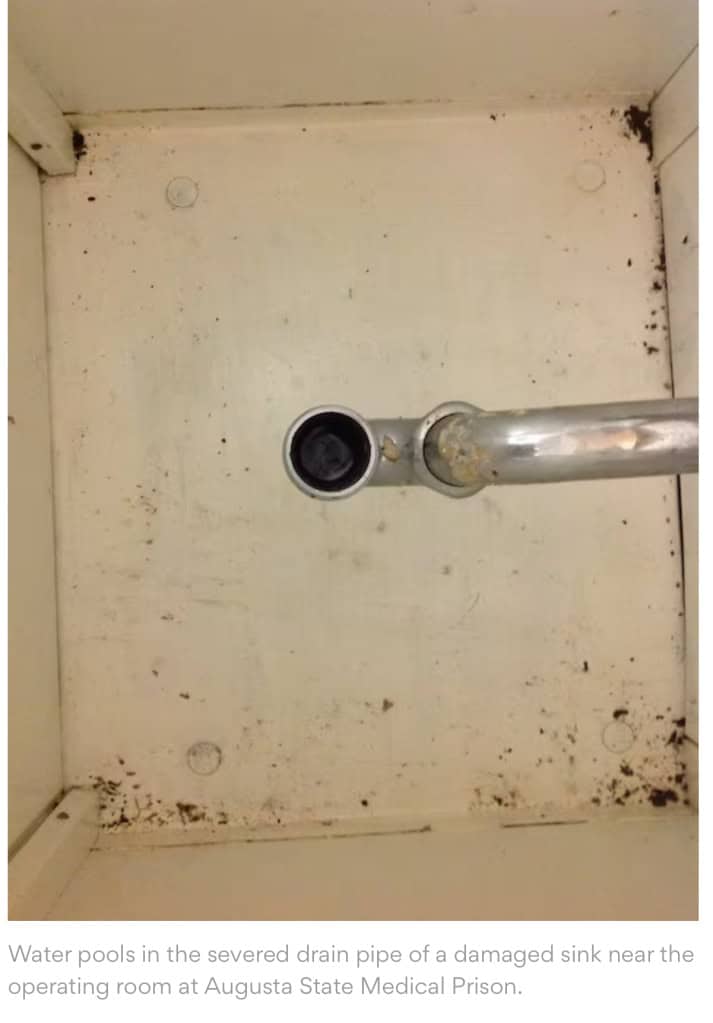
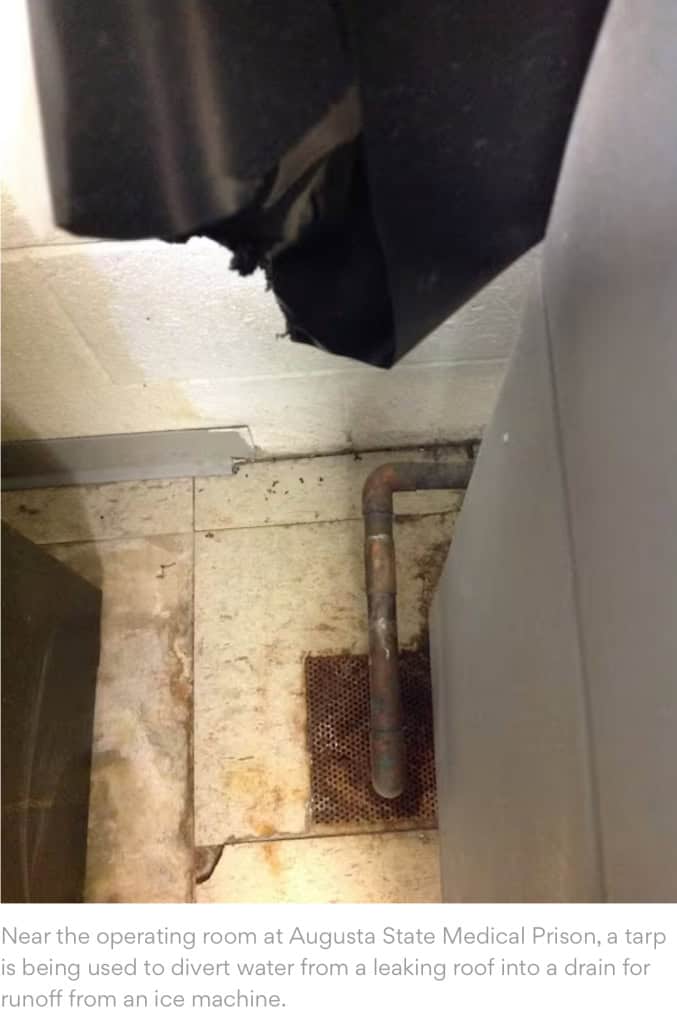
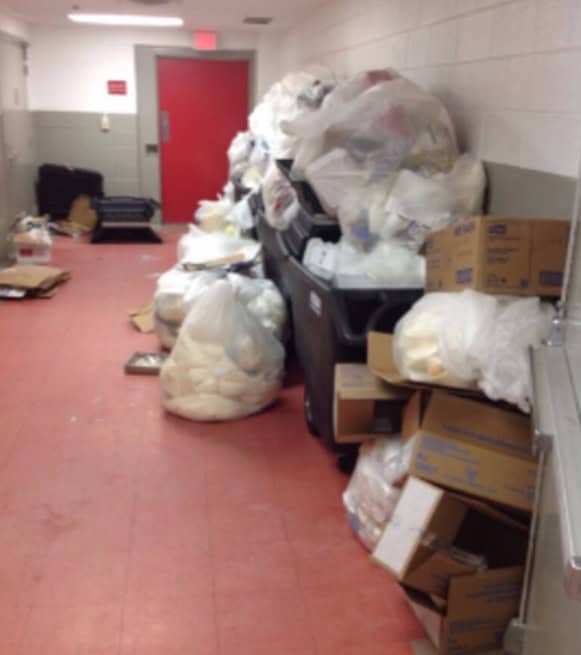
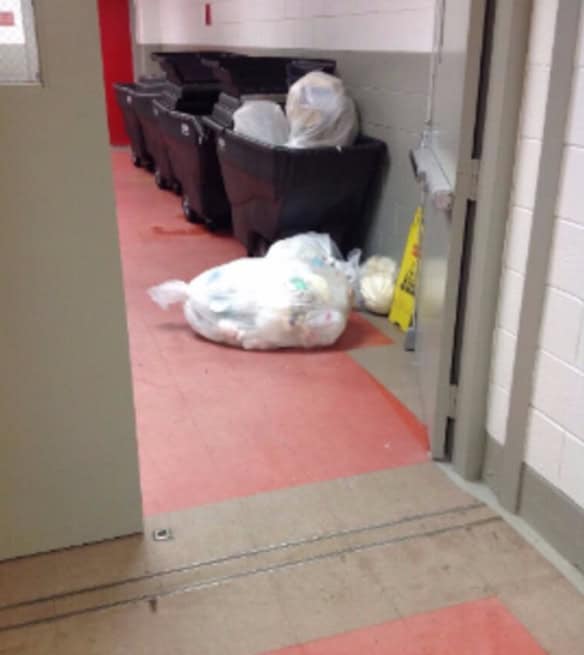
(Photos above courtesy of the Atlanta-Journal Constitution)
Medical Neglect
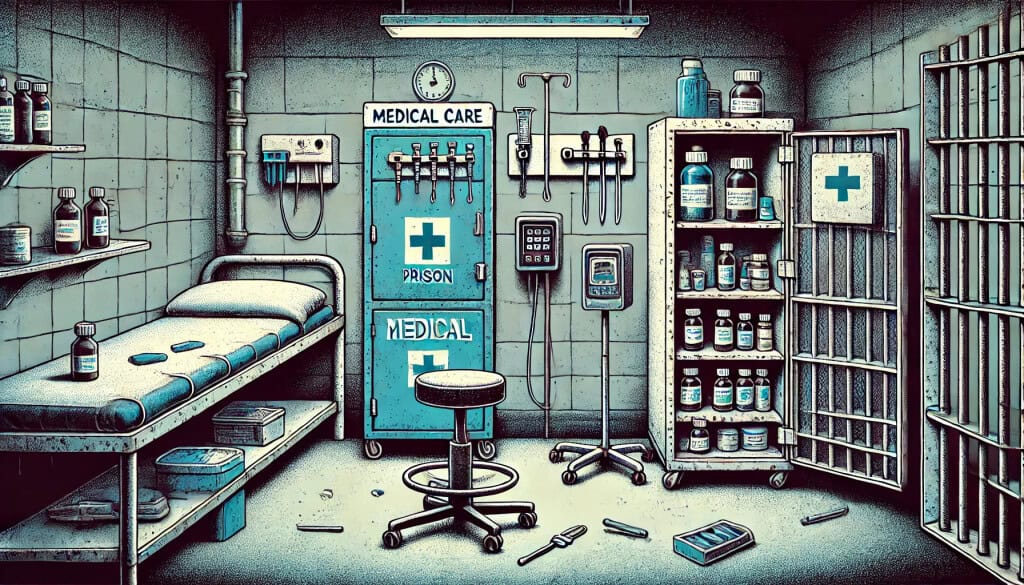
Compounding the filth is severely inadequate medical care – another area where Georgia violates ACA guidelines (and basic human decency). ACA standards call for timely access to healthcare and essential services, but Georgia’s prisons are chronically understaffed and fail to provide even minimal care in many cases. The Department of Justice found a pattern of “deliberate indifference” to prisoners’ medical and safety needs in Georgia17. Inmates frequently wait months for critical medical treatment. For example, mental health care is so backlogged that incarcerated people face 10-month waits to see a psychiatrist, which the DOJ noted is effectively a denial of care18. Life-threatening illnesses are often neglected – only about 10% of prisoners with Hepatitis C or HIV were receiving proper treatment, with others left languishing untreated for months19. This neglect has proved deadly: Georgia’s prison mortality rates (from violence, untreated illness, suicide, etc.) have surged, reaching crisis levels in recent years.
In 2024 alone, 330 people died in Georgia prisons, nearly 100 by homicide, underscoring the lethal consequences of the state’s failure to protect and care for those in custody20.
Individual horror stories illustrate the human cost of this negligence. At Lee Arrendale prison, postpartum women were denied basics like clean clothing and medical checkups – in one egregious case, a mother developed an infection after giving birth and was forced to remove her own vaginal stitches with a toenail clipperbecause the prison refused to provide proper post-surgical care or timely follow-up12. Prisoners routinely report that their medical sick calls go unanswered; even severe symptoms are often ignored until they turn fatal. These conditions have been condemned by federal officials and courts as unconstitutional, yet little has changed on the ground.
The ACA’s healthcare standards – which require adequate medical staffing, sanitary infirmaries, and prompt treatment – are plainly not being met. Georgia’s prisons instead operate in a state of gross neglect, where untreated wounds fester, infectious diseases spread in dirty dorms, and even basic needs like clean water, toilets, and pest-free sleeping areas are not guaranteed.
Conclusion
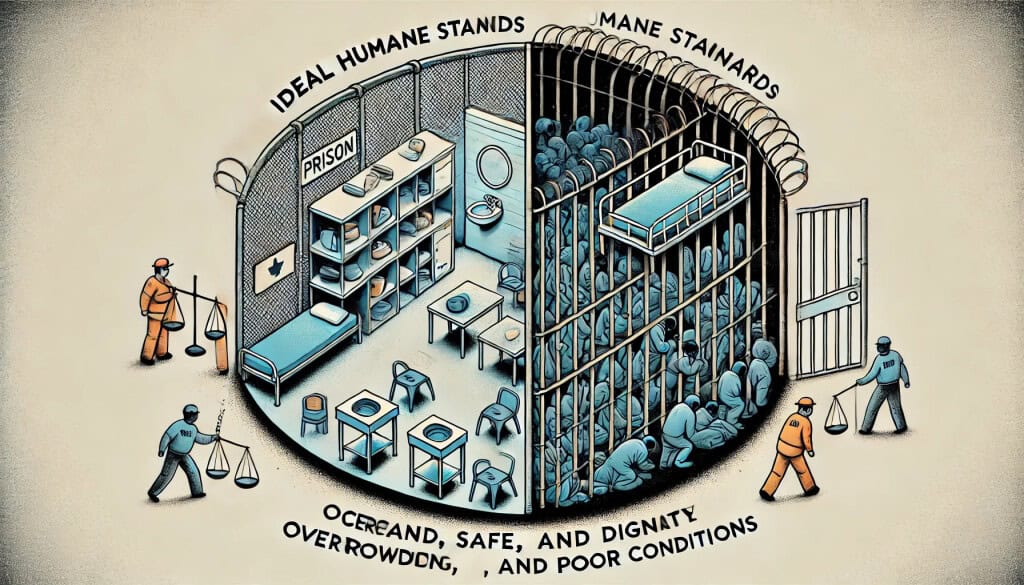
In summary, Georgia’s prison system blatantly violates ACA guidelines on multiple fronts. Cells are overcrowded to an extreme degree, robbing inmates of safe living space and fueling violence. Nutrition is so poor that prisoners are underfed, malnourished, and kept perpetually hungry – a direct failure to meet ACA’s standards for caloric adequacy and meal frequency.
Sanitation and health conditions in many facilities are abysmal: vermin, mold, filth, and lack of care create an environment that can only be described as inhumane. All of this stands in stark contrast to Georgia officials’ claims of ACA compliance. While the state may claim on paper to follow ACA rules or even earn accreditation plaques, the reality inside Georgia’s prisons is one of systemic abuse and neglect.
Multiple independent investigations (by the DOJ, journalists, and advocacy groups) have exposed the truth: Georgia’s prisons are failing basic human rights standards despite any ACA certification claims2117.
In effect, Georgia has weaponized accreditation as a PR shield while continuing practices – like triple-bunking, starvation-level diets, and unsanitary neglect – that flagrantly violate ACA’s core requirements for humane treatment 21. The conditions described above underscore that Georgia’s prisons are ACA-compliant in name only, and urgent reforms are needed to bring actual conditions up to the minimum standards of decency that the ACA (and the Constitution) demand 22.
Take Action: Demand Accountability and Humane Conditions
The Georgia prison system continues to violate basic human rights and established standards of care. But change will only come when we speak out together. Your voice matters—and it’s needed right now.
Use Impact Justice AI to easily send personalized emails to your legislators, media outlets, and key decision-makers. Together, we can expose these abuses and push for real, lasting reform.
You can also:
- Directly contact your local representatives to advocate for humane prison conditions.
- Write letters or emails to the editors of local news publications demanding coverage of this crisis.
- Share this article on social media platforms to spread awareness and mobilize others to join the cause.
The cruelty and negligence must stop. Stand up today to protect human dignity, demand accountability, and help transform Georgia’s broken prison system.


- https://gdc.georgia.gov/press-releases/2018-08-14/aca-accreditation-awarded#:~:text=The%20accreditation%20process%20provides%20the,personnel%20on%20a%20continual%20basis[↩]
- https://www.justice.gov/archives/opa/pr/justice-department-finds-unconstitutional-conditions-georgia-prisons#:~:text=“Our%20findings%20report%20lays%20bare,only%20harm%20the%20people%20Georgia[↩]
- https://prospect.org/article/georgia-largest-prison-work-strike-ever./#:~:text=,lawyers%20to%20litigate%2C%20or%20both[↩][↩]
- https://en.m.wikipedia.org/wiki/Prison_cell[↩]
- https://www.reuters.com/article/world/uk/seven-georgia-guards-face-charges-in-wake-of-prison-strike-idUSTRE71L5SF/#:~:text=Georgia%20prisons%20are%20under%20strain,and%20advocates%20for%20prisoner%20rights[↩]
- https://www.reuters.com/article/world/uk/seven-georgia-guards-face-charges-in-wake-of-prison-strike-idUSTRE71L5SF[↩]
- https://www.gpb.org/news/2009/11/29/county-jails-overcrowded-state-prisoners#:~:text=Officials%20with%20the%20Georgia%20Department,bunking%20inmates%20at%20some%20facilities[↩]
- https://sites.brown.edu/publichealthjournal/2023/05/02/beyond-the-food-how-prison-nutrition-policy-contributes-to-lasting-chronic-disease/#:~:text=The%20American%20Correctional%20Association%20offers,margarine%20and%20fortified%20mineral%20powders[↩][↩]
- https://gps.press/nutrition-neglect-how-georgias-prison-food-is-fueling-violence/[↩][↩][↩][↩][↩][↩][↩][↩]
- https://gps.press/nutrition-neglect-how-georgias-prison-food-is-fueling-violence/[↩]
- https://gps.press/nutrition-neglect-how-georgias-prison-food-is-fueling-violence[↩]
- https://nowhabersham.com/arrendale-prison-accused-of-inhumane-treatment-by-schr/[↩][↩][↩]
- https://www.ajc.com/news/state–regional/documents-unsanitary-conditions-long-ignored-prison-hospital/EyABXkbYrxC2JPBPsmHlnM/#:~:text=Bags%20of%20garbage%20have%20piled,hazards%20for%20doctors%20and%20nurses[↩]
- https://www.ajc.com/news/state–regional/documents-unsanitary-conditions-long-ignored-prison-hospital/EyABXkbYrxC2JPBPsmHlnM/[↩][↩]
- https://interminablerambling.com/2021/08/26/open-letter/#:~:text=bloodied%20and%20stained%20clothes%20from,day%20or%20the%20next%20day[↩]
- https://interminablerambling.com/2021/08/26/open-letter/[↩]
- https://www.ossoff.senate.gov/press-releases/following-doj-investigation-sens-ossoff-rev-warnock-urge-state-of-georgia-to-swiftly-address-unconstitutional-conditions-in-state-prisons/#:~:text=“On%20October%201%2C%202024%2C%20DOJ’s,”[↩][↩]
- https://gps.press/delays-in-georgia-prison-medical-care-causes/#:~:text=,of%20those%20in%20need[↩]
- https://gps.press/delays-in-georgia-prison-medical-care-causes/[↩]
- https://gps.press/featured-articles/[↩]
- https://www.justice.gov/archives/opa/pr/justice-department-finds-unconstitutional-conditions-georgia-prisons[↩][↩]
- https://gps.press/crisis-in-georgias-prisons-what-experts-say[↩]
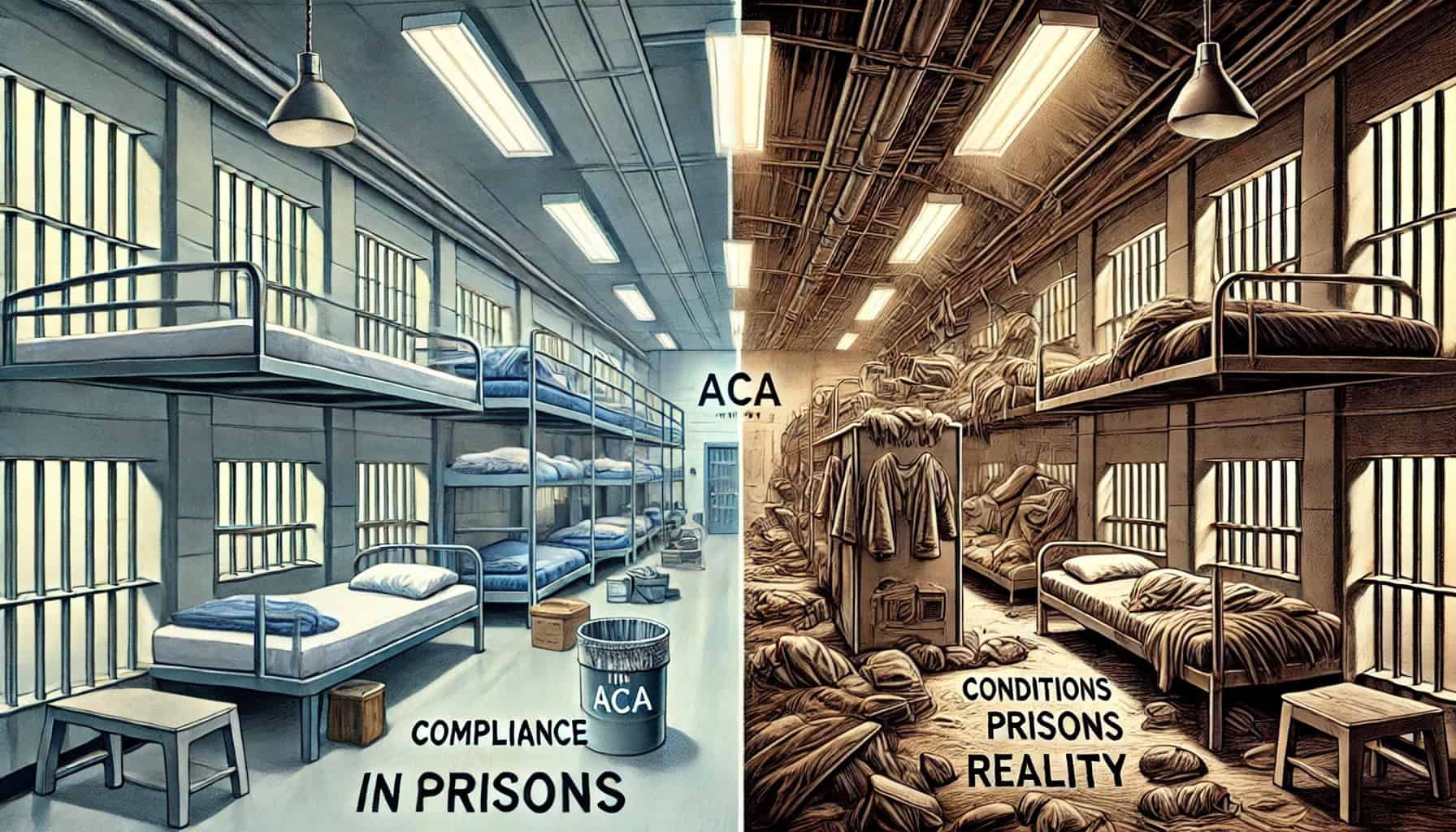
My daughter is at Arendale State Prison and just told me there are dead rats in the kitchen area and she can’t even eat because the smell is horrendous!!!! It’s over crowded and why??? Are the people responsible for taking care of inmates safety lining their pockets??? Cause this is exactly what it sounds like!!!! Inhumane!!!!!!!!! They should be ashamed!!!!